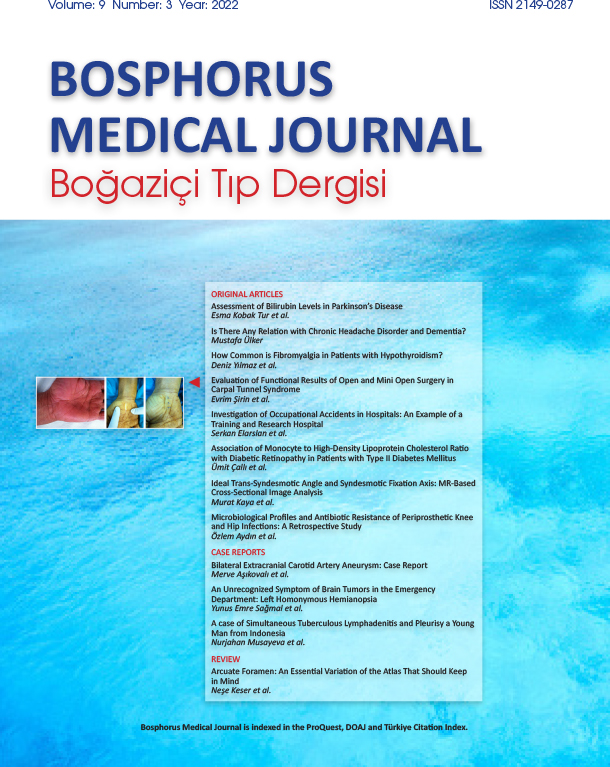Investigation of the Relationship Between Thyroid Function Tests and COVID-19: A Retrospective Study
Hakan Aydın, Halil DoğanDepartment of Emergency Medicine, University of Health Sciences, Bakirkoy Dr. Sadi Konuk Training and Research Hospital, Istanbul, TürkiyeINTRODUCTION: The coronavirus disease 2019 (COVID-19), causing a worldwide pandemic, affects various organs and systems. The effects of COVID-19 on the thyroid axis remain uncertain. Our aim is to examine the changes in thyroid function tests in patients with COVID-19 and to evaluate the effectiveness of these changes in predicting the prognosis.
METHODS: This retrospective study was conducted in 1891 adult patients visited to the emergency department with suspected COVID-19. The diagnosis of COVID-19 was confirmed by reverse transcriptase-polymerase chain reaction (rt-PCR), and patients were divided into two groups as those with and without COVID-19. COVID-19 patients were divided into groups according to their clinical severity and prognosis. The groups were compared in terms of free triiodothyronine (FT3), free thyroxine (FT4), and thyrotropin (TSH) levels.
RESULTS: The rate of laboratory-confirmed COVID 19 patients was 54.7% in the patients included in the study. In COVID-19 patients, the hospitalization rate was 56.7%, the intensive care unit admission rate was 7.7%, and the in-hospital mortality rate was 5.4%. Most of the COVID-19 patients (60.1%) were euthyroid. Hyperthyroidism (overt 3.7%-1.3%, p=0.001; secondary 13.64.6%, p<0.001) and non-thyroid illness syndrome (NTIS) (18.93%, p<0.001) were more common in COVID-19 patients than in non-COVID19 patients. Patients with COVID-19 had lower TSH and FT3 levels and higher FT4 levels compared to those without COVID-19. Similarly, among COVID-19 patients, lower TSH and FT3 and higher FT4 levels were seen in deceased patients compared to survivors (p<0.001).
DISCUSSION AND CONCLUSION: High FT4 levels combined with low TSH and FT3 levels may represent a type of NTIS that occurs in the acute phase of COVID-19. This pattern appears to be predictor of poor outcome of patients with COVID-19.
Tiroid Fonksiyon Testleri ile COVID-19 Arasındaki İlişkinin Araştırılması: Geriye Dönük Bir Çalışma
Hakan Aydın, Halil DoğanSağlık Bilimleri Üniversitesi, Bakırköy Dr. Sadi Konuk Eğitim ve Araştırma Hastanesi, Acil Tıp Kliniği, İstanbul, TürkiyeGİRİŞ ve AMAÇ: Dünya çapında bir pandemiye neden olan koronavirüs hastalığı (COVID-19), çeşitli organ ve sistemleri bozmaktadır. COVID-19'un tiroid ekseni üzerindeki etkileri belirsizliğini korumaktadır. Bu çalışmanın amacı, COVID-19 hastalarında tiroid fonksiyon testlerindeki değişiklikleri incelemek ve bu değişikliklerin prognozu öngörmedeki etkinliğini değerlendirmektir.
YÖNTEM ve GEREÇLER: Bu retrospektif çalışma, COVID-19 şüphesiyle acil servise başvuran 1891 yetişkin hastada yürütüldü. COVID-19 tanısı revers transkriptaz-polimeraz zincir reaksiyonu (rt-PCR) ile doğrulandı ve hastalar COVID-19 olan ve olmayan olarak iki gruba ayrıldı. COVID-19 hastaları klinik şiddet ve prognozlarına göre gruplara ayrıldı. Gruplar serbest triiyodotironin (FT3), serbest tiroksin (FT4) ve tirotropin (TSH) düzeyleri açısından karşılaştırıldı.
BULGULAR: Çalışmaya alınan hastaların %54.7'sinin COVID-19 olduğu laboratuvar testi ile doğrulandı. COVID-19 hastalarında hastaneye yatma oranı %56.7, yoğun bakım ünitesine kabul oranı %7,7 ve hastane içi ölüm oranı %5.4tü. COVID-19 hastalarının çoğu (%60.1) ötiroiddi. COVID-19 olan hastalarda COVID-19 olmayan hastalara kıyasla hipertiroidi (aşikar %3.7-%1.3, p=0.001; ikincil %13.6-%4.6, p<0.001) ve tiroid dışı hastalık sendromu [non-Thyroid illness Syndrome (NTIS)] (%18.9-%3.0, p<0.001) görülmesi daha yaygındı. COVID-19'lu hastalarda, COVID-19 olmayanlara kıyasla daha düşük TSH ve FT3 düzeyleri ve daha yüksek FT4 düzeyleri vardı (p<0.001). Benzer şekilde COVID-19 hastaları arasında hayatta kalanlara kıyasla ölen hastalarda daha düşük TSH ve FT3 ve daha yüksek FT4 seviyeleri görüldü (p<0.001).
TARTIŞMA ve SONUÇ: Düşük TSH ve FT3 düzeyleri ile birlikte yüksek FT4 seviyeleri COVID-19'un akut fazında ortaya çıkan bir NTIS tipini temsil edebilir. Bu model, COVID-19 hastalarında kötü sonlanımın bir göstergesi gibi görünmektedir.
Corresponding Author: Hakan Aydın, Türkiye
Manuscript Language: English




















